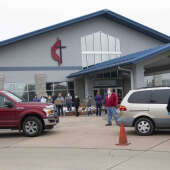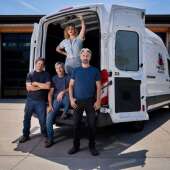Thursday, October 25, 2018
Cape Girardeau, Missouri
Jack Rickard cobbled together his first electric car in 2008.
“Went 94 miles an hour on the first test drive and 110 miles on the first charge,” he recalls. “And that’s when I got pissed.”
The successful test, he says, only made him wonder why on earth there weren’t more electric cars being produced. It was a prospect so intriguing he spent the following decade working on it continuously through his Cape Girardeau shop, EVTV Motor Werks, electrifying conventional cars and tinkering with high-capacity battery tech.
But he doesn’t do much in the way of electric cars anymore. The technology, he says, is past the early-adopter phase and no longer such an exciting frontier.

“My impact on electric vehicles will diminish from here on. We won,” he says. “Let’s take a victory lap and move on.”
Instead, he’s focused on solar energy storage, because moving on means spending time working on the problems that are still years away.
“I live out a few years ahead of you guys,” he says before gesturing to his current project, a blinking refrigerator-sized box called the Powersafe 100. “Five or six years from now, you’ll really want one of these things.”
Rickard says that’s the prophesy-and-hindsight cycle he typically finds himself in: he’ll spend five or six years working on a problem nobody knows they have yet, see six months of recognition once the problem manifests and then watch as the popular discourse takes the solutions for granted.
“Then people say, ‘Well of course! It was obvious all along,’” he says.
By then, however, he’s moved on to the next problem.
“We have a couple interesting technical and economic societal waves coming together in a sort of perfect storm right now,” he says.
First, the technology involved in harvesting solar power is getting better and cheaper, and that will make conventional utilities less and less desirable. To understand this dynamic, he says, think LED light bulbs. At first, they were expensive to make and expensive to purchase, but they were so cost-effective, they essentially paid for themselves. Once people realized this and demand for the bulbs kicked off, manufacturers could justify putting their resources into making more of them. Take into account the economies of scale, and now LED bulbs can be had for pocket change.
Second, Rickard sees a gap in the existing solar infrastructure found in most residential homes.
“Half of the solar installations in the U.S. have been installed in the last 24 months,” he says. “And 97 percent of those installations have no solar storage.”
That means most people’s panels are useless at night or on cloudy days. For now, Rickard says, most people just switch back to conventional electricity in those cases. But if they had a way to bank up energy during the day, they could be more or less self-sufficient.
That’s where the Powersafe comes in, providing the storage to make point-of-use generation feasible. But what do you need to store a few days’ worth of energy?
A wrecked Tesla, for starters.
That leads to the third factor, which Rickard says is the proliferation of electric vehicle batteries, and more specifically, their warranties.
“Battery has a 10-year warranty, which in practice is essentially a lifetime warranty, since most people only keep their cars for 9.5 years on average,” he explains. “But you can wreck an electric car just as quick.”
The warranty, however, means nobody in need of a battery is going to a junkyard to salvage one. Why would they when they could just call up the manufacturer and get a fresh one?
“They have no automotive replacement value at all,” he says.
So they get picked up by people like Rickard, who likes to try to reverse-engineer them to make power banks. He says if the sun went out right now, his shop would have power for about the next three days.
If Rickard is right about solar storage, he’ll have another victory lap to take in a few years.
Until then, he says, “We’re driving on sunshine.”

































